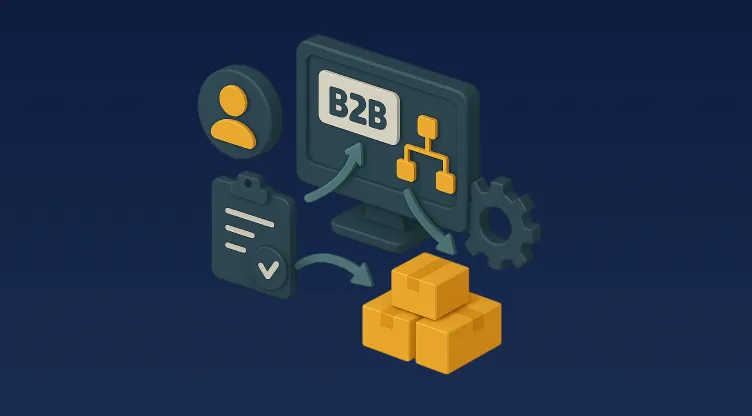Top WMS Integrations to Boost Warehouse Efficiency

Table of Contents
Today's business world, driven to move quickly and still closely interconnected, is a game out of which a standalone warehouse cannot play. Modern warehousing is a complex ecosystem that depends on the effective exchange of information between different components in order to operate at its best. This is where WMS integration becomes crucial.
A strong warehouse management system (WMS) is the core of an effective warehouse, but it must be wholly integrated with other critical business applications to be truly effective. Integration of warehouse management system allows real-time data transfer, which obviates data silos and thereby can achieve wholeness in the view of the operation.
This connectivity enables organizations to create meaningful decisions, optimize processes, and improve overall efficiency. If WMS integration is not implemented, companies are in danger of data inconsistencies, manual errors, and operational roadblocks that prevent business growth and profit. That is why it is no longer a possibility but a duty to invest in its natural integration with WMS and other central systems, which is, in itself, no longer a privilege but a necessity.
Top WMS Integrations for Optimizing Operations
ERP Integration with WMS for Seamless Data Flow
ERP integration with WMS may be considered the most important of the integrations to improve warehousing. Enterprise Resource Planning (ERP) systems manage core business activities, including finance, accounting, sales, and procurement (purchases).
Warehouse management system integration with your ERP provides a seamless flow of data between your core operations of the warehouse, your ERP, and your corporation. Integrating the ERP product with WMS breaks data silos, eliminates manual data entry, and allows all departments access to real-time, accurate data on inventory, orders, and shipments. This is an essential feature of the ERP integration with WMS.
This seamless data integration capabilities provided by WMS integration enable companies to make more intelligent decisions, optimize inventory management, and improve operational effectiveness. This is a core benefit of warehouse automation software.
- Eliminates data silos.
- Reduces manual data entry.
- Provides real-time information across departments.
- Improves decision-making and inventory management.
Transportation Management System (TMS) Integration
Shipping and receiving can be made even more efficient by integrating your WMS with a Transportation Management System (TMS). The transportation management system oversees the optimization, planning, and execution of transportation.
WMS and TMS integration enables real-time shipment monitoring, routing optimizations, and dock scheduling efficiencies. Warehouse management system integration will ensure they will be expedited in order to minimize delays and transportation costs for shipped and received products.
Such WMS integration also automatically generates and documents shipping labels, increasing shipping efficiency. This is a prime example of how warehouse automation software can enhance logistics.
- Real-time shipment tracking.
- Optimized routing and dock scheduling.
- Reduced transportation costs and delays.
- Automated shipping label generation.
Integration with Automated Material Handling Systems
Integration of a WMS is critical for warehouses using automated material handling systems (AMHS), which include conveyors, automated guided vehicles (AGVs), and robotic picking systems.
This Warehouse Management System (WMS) integration enables the WMS to directly control and coordinate the processes of these automated systems, improving material movement and throughput.
This WMS integration's ability to transport commodities effectively across the warehouse reduces reliance on human intervention and enhances system performance. Advanced warehouse automation software installations often include this integration.
- Direct control of automated systems.
- Optimized material flow and increased throughput.
- Reduced manual handling.
- Essential for advanced warehouse automation.
E-commerce Platform Integration
For companies that sell online, it is essential to connect their warehouse management systems with e-commerce platforms such as Shopify, Magento, and Amazon.
This WMS integration streamlines order processing, updates inventory, and confirms shipping, guaranteeing a seamless and effective order fulfillment experience.
This integration of warehouse management systems offers immediate insight into inventory levels across various sales channels, helping to avoid overselling and enhance customer satisfaction. It represents a significant advancement in warehouse automation software.
- Streamlined order management and real-time inventory adjustments.
- Immediate insight into inventory across various sales platforms.
- Mitigates the risk of overselling while enhancing customer satisfaction.
- Efficient order processing.
CRM Integration for Enhanced Customer Service
Connecting your WMS to your Customer Relationship Management (CRM) solution will provide a powerful help to customer service.
This WMS integration also provides customer service agents real-time access to order, shipment, and inventory status, enabling them to share accurate and current information with customers.
- Instantaneous retrieval of order and inventory data feeds for customer service.
- Improved customer communication and issue resolution.
- Enhanced customer satisfaction and loyalty.
- Highlights the benefits of ERP integration with WMS.
The integration of this warehouse management system enhances tailored communication and proactive problem-solving, ultimately fostering improved customer satisfaction and loyalty. This serves as yet another illustration of the advantages that ERP, when paired with WMS and additional systems, can bring to the overall performance of a business. Overall, the integration of WMS is essential for the operations of modern warehouses.
Benefits of WMS and E-commerce Platform Integrations
Real-Time Inventory Sync for Multi-Channel Operations
Today, in the current omnichannel trade atmosphere, selling should be done from various platforms- your website, marketplaces like Amazon and eBay, and even your brick-and-mortar store to reach as many prospective clientele as possible. However, keeping stock across these different channels can quickly become logistically overwhelming without effective WMS integration. Integration between the e-commerce platform and WMS delivers real-time synchronized inventory so that stock levels are always in step across all sales channels.
This would reduce overselling, backorders, and, most importantly, disappointed customers. With this real-time inventory information, firms could easily manage their multichannel business operations, optimize stock, and seize sales opportunities. This would also bestow real-time visibility into the integration of the warehouse management system.
Reducing Order Processing Time
Order fulfillment and shipping speed are key factors in customer satisfaction. Manual order dispatching is time-consuming and monotonous; hence, customers experience delays and dissatisfaction. The introduction of the WMS into e-shop platforms, automating order fulfillment processes, leads to a significant reduction in order processing time. Whenever a purchase is made on the e-commerce website, its information is automatically pushed to the WMS.
The WMS then generates picking lists, optimizes picking routes, and manages the packing and shipping process. This decreases the workflow and can enable automated data acquisition, decreased computing time, and the orders will be shipped quickly and without problems. This highlights the value of warehouse automation software integration.
Improving Order Accuracy and Customer Satisfaction
Order accuracy is of great importance in order to keep the customers satisfied and retain their loyalty. Process and stock errors, e.g., sending the wrong items or the wrong qty, can result in returns, refunds, and bad reviews. Integration of WMS with e-commerce platforms reduces the likelihood of these errors by automating the exchange of information and providing real-time tracking of the order fulfillment process.
By effectively picking, packing, and shipping products to the appropriate customers warehouse automation software can strongly improve order accuracy as well as customer satisfaction.
This obviously leads to an improved customer experience and results in repeat business.
Streamlined Returns Management
Returns are an unavoidable part of e-commerce. The best return management contributes to loss minimization and customer satisfaction. Overlaying the WMS with the e-commerce sites optimizes the return management workflow by automating the authorization and treatment of returned items.
The details are automatically transferred to the WMS if the customer starts a return process.
The WMS then assumes control over the receiving and replenishment operation and that the returned ones are processed efficiently and incorporated back into the stock. This simplified workflow decreases processing time, reduces errors, and boosts the overall effectiveness of returns management, a direct consequence of integration into an effective warehouse management system.
Enhanced Reporting and Analytics
The integration between a WMS and e-commerce sites not only provides access to valuable data and insights that can lead to the optimization of warehouse operations but can actually be realized at the company-wide level of business performance, e.g., Through integration of information from both systems, corporations can develop custom reports covering a wide range of metrics, including, but not limited to, order volume, fulfillment time, inventory turnover rate, and customer behavior.
These revelations can then be utilized to target specific areas for development, optimize processes, and use concepts that are firmly founded in data to create decisions that enable growth and profitability. There is significant potential for ERP integration with WMS giving a balancing effect, e.g., to function reporting and analytics, which companies can potentially use to leverage the strength of their warehouse automation software for strategic purposes.
Final Thoughts
Seamless data pipeline, intelligent inventory, supersonic order fulfillment, and--in the end--more delighted customers. A warehouse that behaves like a highly organized symphony, each department and piece of the mechanism working in perfect coordination.
Are you sick and tired of warehouse drudgery and looking to live in an age of efficiency? Omniful provides a WMS solution that easily integrates with your current infrastructure. Stop letting disconnected software hold your warehouse back. Reach out to Omniful.ai today and experience how WMS integration can make a huge difference in your operations and put your business on a fast track!























